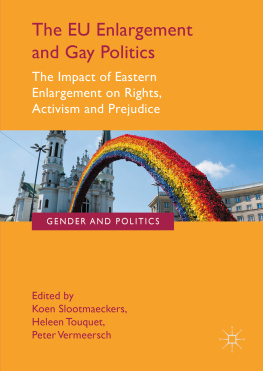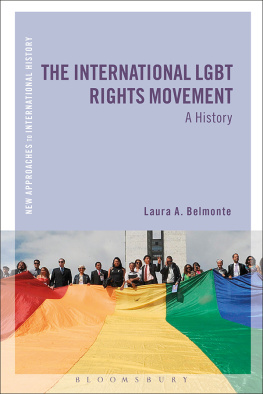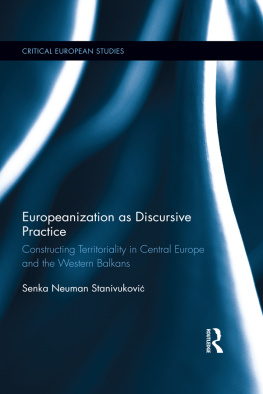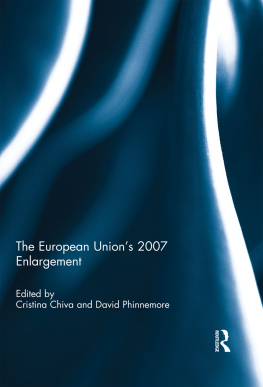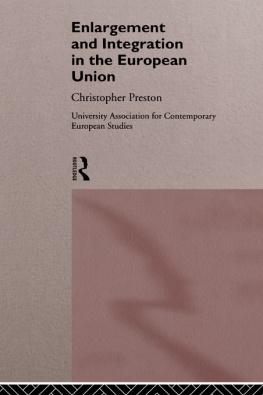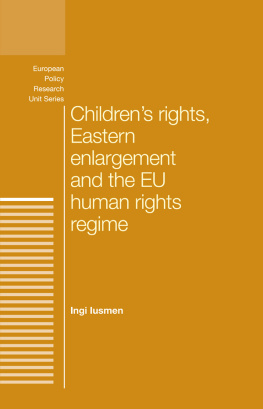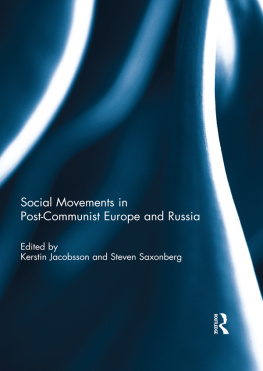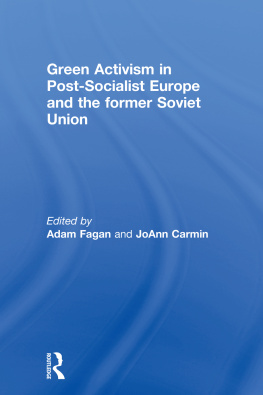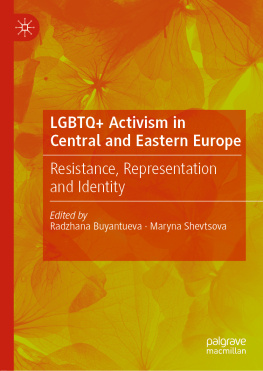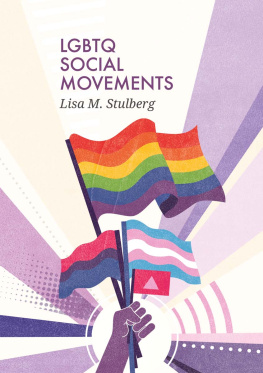1. Introduction: EU Enlargement and LGBT RightsBeyond Symbolism?
Over the last decade, the rights of lesbian, gay, bisexual, and transgender (LGBT) people have become an ever more salient and controversial topic in international politics. LGBT rights are increasingly considered a litmus test for a countrys broader human rights record. As Kenneth Roth, executive director of Human Rights Watch, so eloquently articulated:
The status of the LGBT community is a good litmus test for the status of human rights in society more broadly, precisely because it is such a vulnerable minoritysimilar to the proverbial canary in the coal mine. Where the rights of LGBT people are undermined, you can be sure that the rights of other minorities and critical members of civil society will soon also be in jeopardy.
The monitoring of these rights has become not only a powerful tool for leverage in the hands of international advocacy groups, but also a topic of direct political contestation, both within and among countries. In international relations, politicians have increasingly referred to the subject of LGBT rights in their criticism of other countries. One of the most visible examples was the speech by President Barack Obama on July 25, 2015, in Kenya (see Holmes and Scott ). Obama said:
With respect the rights of gays and lesbians, I have been consistent all across Africa on this. I believe in the principle of treating people equally under the law [] and that the state should not discriminate against people based on their sexual orientation. [] When you start treating people differently not because of any harm they are doing to anybody, but because they are different, thats the path whereby freedoms begin to erode, and bad things happen.
While Obamas address was applauded by international LGBT non-governmental organizations (NGOs), it was strongly condemned by Kenyan president Uhuru Kenyatta. He replied by relegating LGBT rights to the realm of culture:
The fact of the matter is Kenya and the United States share so many values: common love for democracy, entrepreneurship, value for familiesthese are some things that we share. [] But there are some things that we must admit we dont shareour culture, our societies dont accept. It is very difficult for us to be able to impose on people that which they themselves do not accept. This is why I repeatedly say for Kenyans today the issue of gay rights is really a non-issue.
Kenyattas response to Obama is an interesting example of what some authors have called resistance to homonationalism. Jasbir Puar () argues, it can only be resisted or re-signified. In other words, homonationalism structures global politics, as gay-friendliness becomes a key factor in assessing a countrys modernity which cannot be escapeda country will be judged on its gay-friendliness regardless of whether it believes in LGBT rights. Opponents can resist this historical moment only by depicting LGBT rights as a Western, non-universal concept, or they can attempt to re-signify it by linking the meaning of modernity to so-called traditional values.
Similar instances of homonationalism and resistance to it can be found in geographical areas closer to the European Union (EU). Take, for example, the recent developments in Russia and Ukraine. Since 2012, Russia has engaged in a conscious and consolidated effort to build a sexual sovereignty of the nation (Makarychev and Medvedev ).
The events in Ukraine show that LGBT rights have become increasingly salient in the relations between the EU and the countries in its close proximity, and have provided a fulcrum for political contestation. Association with the EU is often equated with support of same-sex marriage by opponents, and the EU similarly gauges countries modernization by examining their stance on LGBT rights. For example, (former) EU Commissioner Fle (
These examples are striking, in that they clearly demonstrate that LGBT rights have acquired important symbolic value in EU politics and discoursee.g. Pride parades, for example, can now serve to illustrate a candidate countrys endorsement of European normsyet such symbolic politics stands in stark contrast to the amount of actual EU power and EU legislation in this field. The EUs acquis on LGBT rights is rather limited.
The aim of this book, therefore, is to disentangle the symbolism from the actual advances on the ground and to more precisely determine the influence of the EU on LGBT rights in former or current enlargement countries. Specifically, we ask the question: what is the impact of the EU enlargement on the political and legal contexts in which these LGBT people live and claim rights? Today, a little over a decade since the first Eastern EU enlargement, we believe it is high time to analyze the impact of this process in the newer member states in Central Europe, as well as to take stock of the lessons learned for the Western Balkans.
Conceptual Background of the Book
In this book, we strive to offer a balanced, thorough, well-investigated, and accessible picture of the state of affairs in LGBT rights and activism in Central Europe and the Western Balkans by providing not only thoughtful reflections, but also a wealth of new empirical findingsarising from legal and policy analysis, large-scale sociological investigations, and country case studies. The authors use different theoretical concepts from institutional analysis, the study of social movements, law, and Europeanization literature. In their chapters, they analyze such issues as the tendency of nationalist movements to turn sexual others into national others, the actions and rhetoric of church actors as powerful counter-mobilizers against LGBT rights, and the role of the domestic state on the receiving end of EU pressure in the field of fundamental rights. The chapters offer the reader insight into emerging Europe-wide activism (Have activists been able to utilize the new European opportunity structure arising from the EU enlargement process to buttress their activism?), into the politics of activism in domestic contexts, and into the complicated relationship between activism and the larger LGBT community (Do highly visible forms of activism such as pride parades manage to connect to and unite LGBT communities?).
Although we did not ask the contributors to use a specific theoretical approach in their chapters, insights from the literature on Europeanization via Enlargement are a central theme throughout the book. Europeanization is often conceptualized as
processes of (a) construction, (b) diffusion, and (c) institutionalization of formal and informal rules, procedures, policy paradigms, styles, ways of doing, and shared beliefs and norms which are first defined and consolidated in the EU policy process and then incorporated in the logic of domestic (national and subnational) discourse, political structures, and public policies. (Radaelli , p. 30)
More simply, it refers to the process of transferring the EUs policies, institutions, rules, beliefs, and values to other countries (Bulmer ). Both perspectives emphasize vertical processes of diffusion in which the EU is the initiator and third states the recipients of the EUs norms and rules.

